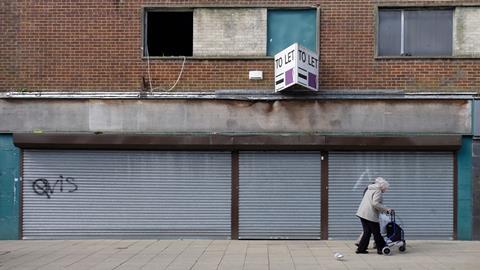The housing secretaryŌĆÖs apparently ambitious vision lacks clarity and detail. The towns he is meant to be helping deserve better, says Carl Brown

I grew up in a former coal mining town in the Midlands and, while I wouldnŌĆÖt say life was bad ŌĆō my family was fairly comfortable and certainly never in poverty ŌĆō the area itself had the air of decline.
Many shops and pubs have closed over the years, leaving large parts of the centre boarded up for extended periods. Public transport connections have always seemed a huge problem, with no train link and an infrequent bus service that leaves the nearest city an hourŌĆÖs ride away.

I left years ago, seeking opportunity and excitement ŌĆō like many of my peers ŌĆō in a university city, and then later in LondonŌĆÖs thriving jobs market.
But my affection for my home town remains, mixed in with a real sense of frustration at decades of under investment in the people who live there and the places in which they live.
This is a very real issue for people across the country, and particularly those who live in single industry post-industrial towns. Seeing decline every day can breed resentment and anger but, more commonly, just a weary feeling that life is not as good as it used to be.
>> See also: Industry underwhelmed by GoveŌĆÖs levelling up vision
For those commentators who point out that there are higher levels of poverty in parts of London, that is evidently true and something that should be tackled. But in towns like mine it is not just about poverty, itŌĆÖs about creating opportunity, wellbeing, civic pride and engaged communities ŌĆō something that has been lacking for decades.
For these reasons the idea of spreading wealth and opportunity around the country, rather than concentrating it disproportionately in London and the South-east, has always struck me as incredibly important, long before the ŌĆ£levelling upŌĆØ phrase was coined.
I was looking forward to Michael GoveŌĆÖs long-awaited proposals detailing the governmentŌĆÖs levelling up ambition. Along with getting Brexit done, this was a central pledge in the 2019 Conservative party manifesto.
So, what to make of the white paper?
My first reaction is that it is commendable that any government would publish a 330-page document setting out plans to level up the UK. The 12 ŌĆ£missionsŌĆØ are encouragingly ambitious, with pledges to boost everything from research and development investment, employment, productivity, public transport connectivity, broadband availability, education, skills, life expectancy, well-being and crime.
It was good to see measurable goals for improving these areas by 2030, well beyond the current electoral cycle. But why, then, does it all feel so flat?
When it comes to housing, the lack of new money ŌĆō or new anything really ŌĆō does nothing to help create the sense that this is a plan of historic magnitude. The ┬Ż1.5bn brownfield land fund, targeted at regenerating derelict sites in 20 cities, (of which, oddly, only two are named in the document, Wolverhampton and Sheffield) will help. But really the impression given is that these amount to little pockets of money for isolated developments.
There are positive moves. The ┬Ż1.5bn Levelling Up Home ║┌Č┤╔ńŪ° Fund (again, a recycled announcement) and a separate Home ║┌Č┤╔ńŪ° Fund will provide useful loan financing for builders to fund development and infrastructure respectively.
Scrapping the 80/20 rule for the housing grant fund under which four pounds in five goes towards areas where house prices are high and rising (so focused on London and the South-east) sounds like it may be significant. And we will wait to see what the repurposed Homes England comes out with in its new strategy later in the year.
It is worth pointing out, though, that the 80/20 rule was only introduced relatively recently by Theresa MayŌĆÖs government, so removing it is by no means a panacea. For several years prior to this rule being introduced the affordable housing grants regime arguably favoured London and the South-east.
I also suspect that a plan of this magnitude will need much more money pumped into it than the sums outlined in the document.
GoveŌĆÖs housing funding measures should help in some areas on a small scale, but it is difficult to see how this adds up to the transformative change we need.
For one thing, housebuilders are facing increasing tax burdens and regulatory costs while council planning departments are under intense resourcing pressure.
Without reform and simplification of the planning system and extra resourcing for planning departments, it is difficult to see how we will get the scale of activity needed for housing to contribute
We donŌĆÖt yet know exactly what form the governmentŌĆÖs planning reforms will take. The levelling up white paper makes little mention of planning beyond enhanced compulsory purchase powers for town centre regeneration, support for ŌĆ£re-using brownfield land for developmentŌĆØ and a ŌĆ£more positive approach to employment land in national policyŌĆØ while protecting green belt.
Without reform and simplification of the planning system ŌĆō and extra resourcing for planning departments ŌĆō it is difficult to see how we will get the scale of activity needed for housing to contribute to levelling up in a really meaningful way.
To my mind levelling up is really about joining everything together. As Mark Henderson, chief executive of Home Group, said last year, there is really no point in a new large factory or other workplace being announced before land has been acquired and allocated for nearby housing, as the price of the land will simply accelerate due to the expectation of future value uplift.
Similarly, to state the obvious, housebuilders wonŌĆÖt build homes unless they are confident that there is a demand to live in an area, bolstered by the necessary infrastructure and transport.
Therefore, as Mark Sitch of Barton Wilmore and others have noted, what is needed is genuinely collaborative spatial planning policies across and within regions. For this reason, maybe the biggest unknown is how the governmentŌĆÖs new devolution agenda will play out.
>> See also: Where is the money to support GoveŌĆÖs bold plans?
Will it create a set of public bodies whose job is to administer cash handed out from the centre? Or will it create a system that can lead to public and private bodies working together to provide what is needed on a regional and sub-regional basis?
The aim really is to ensure that people have money in their pocket and feel comfortable and proud to spend it locally. If local areas can collaborate and create the jobs and build the homes, infrastructure and transport connections and utilities that we need, this will feel a lot like levelling up (although I fear this will still need a huge injection of govenment cash as well).
So, until we get far more clarity over planning and devolution, and extra funding for cash-strapped planning departments, it is difficult to see how the levelling up plans will really become a reality.
Carl Brown is assistant editor at ║┌Č┤╔ńŪ°, Housing Today and ║┌Č┤╔ńŪ° Design



























No comments yet